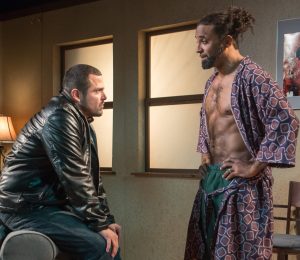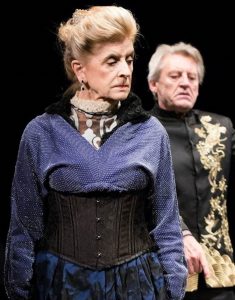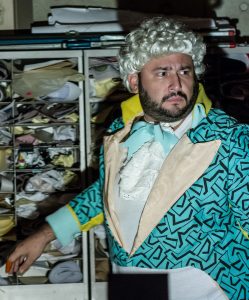Damon Chua’s Incident at Hidden Temple, the current offering of Pan Asian Repertory Theatre, takes place in 1943 China, a dramatic juncture in East-West political relations and highly promising background for a play. The Nationalist Party and the Chinese Communists, usually incompatible as water and oil, have forged an alliance to resist Japan’s aggression. The two political groups—led, respectively, by Chiang Kai-Shek and Mao Tse-Tung—are restive bedfellows, with scant potential for long-term cooperation.
AdA: Author Directing Author
The third edition of AdA: Author Directing Author has programmed three one-acts based on the theme of power. This year AdA founders Neil LaBute and Marco Calvani are joined by Spanish playwright Marta Buchaca, with each presenting a play directed by one of the others.
DannyKrisDonnaVeronica
DannyKrisDonnaVeronica is a captivating production about the modern family structure and the often untold truths of being a parent. Playwright Lawrence Dial explores the reality of marriage and life after children. Although it often seems taboo to speak about the visceral feelings of sadness and hopelessness associated with being a parent, Dial’s play explores the dichotomy of being completely enamored by one’s children while harboring feelings of dismay—the joys of having a family as well as those hidden, or rather, silent, moments of losing one’s identity and becoming irrelevant.
The Beauty Queen of Leenane
Back in 1996, Martin McDonagh, a 25-year-old playwright, made a stunning debut with his play The Beauty Queen of Leenane, revitalizing that old war horse, the well-made play. Within a few years, he had several more successes under his belt: A Skull in Connemara and The Lonesome West joined Leenane to form a trilogy, not to mention his Aran Islands plays, The Cripple of Inishmaan and The Lieutenant of Inishmore (a third is still expected for a second trilogy).
Life Is for Living
He was a jack of all trades artistic and master of them all. Trendsetter and admired cultural icon, Noel Coward was a British actor, playwright, dancer, composer and lyricist of songs, musicals and operettas, screenwriter and director, painter, novelist, and diarist, whose style, rapier wit, and intellect dominated the worlds of British theater and entertainment throughout the 1930’s, ’40s, and ’50s. Coward is the larger-than-life subject of Simon Green and David Shrubsole’s intimate evening Life Is for Living: Conversations with Coward at 59E59 Theaters. The presentation, the newest in a series of this British team’s collaborations devoted to Coward, uses Coward’s songs with excerpts from his diaries, verse, and letters, to offer us a glimpse into the breadth, artistry, life, and wit of the Master.
This Day Forward
This Day Forward continues playwright Nicky Silver’s meditation on parent-child relationships that he made a success of with The Lyons. His caustic new play focuses on the damage that parents can inflict on children—it’s a broad canvas of emotional (and sometimes physical) abuse, distilled into two acts set a generation apart.
Poison
Dutch playwright Lot Vekemans’ Poison, directed by Erwin Maas for Origin Theatre Company, delicately tells a story of loss, pain and grief with an unspoken complexity. This gnawing two-person play, elegantly translated in to English by Rina Vergaano, unfolds in a nondescript white room with an equally nondescript vending machine, a perfect room for waiting. As the audience arrives, actor Michael Laurence, who plays a character known only as He, is found doing just that—waiting. He is checking his phone, pacing, drawing intrigue by the slightest shake of his foot. Laurence conveys the growing stress on He’s nerves, until the light goes down and the play begins. Soon after, his character is joined by an anxious Birgit Huppuch as She, and the intricate layers of their relationship begin to reveal themselves. After having been separated, without speaking, for nine years, the couple has been brought together to discuss what is to be done about the groundwater poisoning that is seeping into the grave of their deceased young son.
Sweat
Editor's note: Sweat, which opened on Broadway March 26, was reviewed in November for Offoffonline by Charles Wright. His review is reprinted here:
Lynn Nottage's Sweat is tailored for the current juncture in American political life. This dark, often humorous drama concerns eight Rust Belt factory workers grappling with effects of industrial mechanization and the transfer of blue-collar jobs to other countries, especially Mexico, where operating costs are well below those in the United States.
Dead Poets Society
Dead Poets Society, a new play written by Tom Schulman, the screenwriter for the 1989 film that starred Robin Williams, Ethan Hawke and Robert Sean Leonard, is a deft, engaging stage version superbly directed by John Doyle for his first production as the artistic director of Classic Stage Company. The story, set in 1959 in a boys’ prep school, Welton Academy, follows a half dozen young men whose lives are affected by John Keating, an English professor. Keating is the kind of teacher who believably inspires his students and urges them to think for themselves rather than unquestioningly follow the rules adults have set out. In its way, Dead Poets Society is a veiled attack on the dangers of fascism that resonates particularly since the election.
Ardor
Ardor, the fourth play by playwright and director Matthew Gasda, reflects an impressive literary talent. Gasda has given the actors in his new ensemble drama material that is raw, fresh, honest, poetic, deep, daring and, clearly, a joy to perform. Their conversations are at once innocent and knowing, as well as both painfully cutting and a pleasure to hear.
Sagittarius Ponderosa
MJ Kaufman’s latest play, Sagittarius Ponderosa, tells the story of a young man returning home to help take care of his ailing father. The play, staged by the National Asian American Theatre Company (NAATCO), begins at a Thanksgiving dinner with the young man, his father and mother, and his grandmother expressing what each is grateful for. This opening scene is telling. On one hand, it’s a precursor to many familiar stories: a young person returning home attempting to make his way in the world, and his struggle with sexuality, love, and attachment; a child taking care of an elderly parent; a wife coming to terms with the eventual death of her husband; a grandmother’s struggle with hearing issues, and, more important, her desire to see her grandchild married. Even though Kaufman sets Sagittarius Ponderosa squarely within an Asian-American family, each of these stories is universal.
The Resistible Rise of Arturo Ui
It’s a turning point in American history when a candidate for President suggests, ominously, that should the election not go his way, he will not go quietly into the good night of a peaceful transition of power. Bertolt Brecht’s sprawling farce The Resistible Rise of Arturo Ui is a piercing look at the rise of a thug and petty tyrant whose lessons will not be lost on viewers in this election season. Written in a mere three weeks in 1941, the play is Brecht’s effort to radically deflate the mystique, worship, and awe that despots typically inspire. Joseph Goebbels, the Nazi Minister of Propaganda, viewed his creation of the myth of the Führer as his greatest achievement, an achievement that made possible Adolf Hitler’s consolidation of power even as he was curtailing civil liberties and murdering real and perceived threats to his power. Brecht’s weapon of choice: humor!
Coriolanus
The playbill for the Red Bull production of Shakespeare’s rarely staged Coriolanus gives the time period as "Rome, 493 B.C.E. Here, now." But, under Michael Sexton’s direction, the latter prevails: military men in camouflage fatigues and dress greens, a First Citizen with a T-shirt that reads “You can’t have capitalism without racism,” and several female soldiers all declare it’s now. There’s virtually nothing identifiable from 493 B.C.E.
Addictions of the City
The characters are lively, the language is crisp and urban, and the acting is skilled in Stephen Adly Guirgis's The Motherf**ker with the Hat. The energy of classic salsa music in the house helps pump up the energy at T. Schreiber Theatre’s exciting production. Guirgis’s unabashedly vulgar play explores themes of love, morality and choice in one of the most diverse cities in the world, New York. His characters, although primarily of Puerto Rican extraction, encompass the multiple ethnicities of the city. Most are plagued with addictions and afflictions that raises the stakes of their every move. The play, one of Guirgis’s best, is both hilarious and thought-provoking.
It starts with a high energy-conversation. Veronica (Viviana Valeria) is on the phone with her mother, who has an addiction to alcohol; Veronica dislikes her mother’s fish-faced boyfriend and tells her, “You’re dating a “fuckin’ big-time loser with a head like a actual fuckin’ fish! …Ma, when you see him tonight: Take a moment. Take a breath. Take a real good look and just ax yourself in all honesty—‘Do I wanna fuck him—or fry him up with a little adobo and paprika...?’”
Wrapped around the jokes and comic dialogue lies the issue of coping, or rather, surviving. Guirgis’s characters are struggling with heavy substance abuse and making it one day at a time. Each day is a journey for them. They include Jackie (Omar Bustamante) who enters with flowers in his hands and greets Veronica with enthusiasm and love. He chants a rhythmic “These flowers are for my Beautiful Boriqua Taino Mamacita Love Me Long Time Princess fuckin’ Beauty Queen.” Having just landed a job, Jackie wants to celebrate. He begins talking about their future, possible promotions—their life together. Still, Veronica is having trouble getting clean..
While Veronica takes a shower, Jackie finds a hat—a hat he knows does not belong to him. He smells the bed and pillows. He then asks Veronica, “Why the bed smell like Aqua Velva and dick?” But Veronica denies any infidelity and tries to calm him down by suggesting they go eat some pie. (That’s right, pie.) He reluctantly agrees.
Ralph D (Casey Braxton) is another one of the conflicted characters in the play. As a sponsor, he is guiding Jackie on the path to sobriety. Yet he is also the cause of Jackie’s fall. Ralph D has had an affair with Veronica while Jackie was in jail. Although Ralph D cares about Jackie, he has completely betrayed him. Ralph D has stayed “clean” from his additions, but he is not "clean" morally or ethically. Victoria (Jill Bianchini) and Jackie try as well, but inevitably fall off the wagon.
Among the charismatic, enigmatic characters is also Cousin Julio (Bobby Ramos). Julio helps Jackie hide a gun that he has used to threaten the man he thought was the owner of the hat. “Leave the gun. Take the empanadas,” he advises, in one of many comic lines. Julio is a delicious dichotomy of a character. Humorous and deep, he values family and is brutally honest, and Ramos’s performance is a crowd-pleaser.
Director Peter Jensen keeps the production’s energy high, and scenic designer Miguel Urbino uses sets that are minimal yet functional. They resemble an urban setting that captures the lives of these characters. Sound designer Andy Evan Cohen provides a taste of the urban Latino scene in New York City with salsa and hip-hop playing between scenes and during intermission—including “So Fresh and So Clean” by Outkast and classics by Hector Lavoe.
The Motherf**er with the Hat is a production you won't want to miss.
The Motherf**er with the Hat plays through Nov. 19 at T. Schreiber Theatre (151 W. 26th St.) Evening performances are at 8 p.m. Wednesday through Saturday; matinees are at 2 p.m. Nov. 9 and 16. Tickets are $20 for general admission; $30 for reserved seating; $40 for dinner plus VIP reserved seating. For more information, call (212) 352-3101 or visit tschreiber.org. The production contains graphic language.
Template for an Epidemic
The adventurous Playhouse Creatures Theatre Company is offering what’s labeled a “20th anniversary production” of Naomi Wallace’s One Flea Spare. This mordant historical drama didn't actually arrive in New York until 1997. It was a critical favorite at the 1996 Humana Festival of New American Plays in the playwright's hometown, Louisville, Ky.; and word of mouth from the Festival made its subsequent engagement at the Joseph Papp Public Theater one of the most anticipated events of the theater season. One Flea Spare, which derives its title from a poem by John Donne, is set in 1665 and portrays four people—a married couple and two strangers—trapped in a house that’s under quarantine. The place is the London of Daniel Defoe’s AJournal of the Plague Year, a work of fiction, which, Wallace has said, inspired the imaginative universe of her play. The current revival, directed by Caitlin McLeod and performed by a fine quintet of actors, is two relentless hours of powerful, if markedly cerebral, dialogue, with a number of narrative surprises for the first-time viewer.
Wallace wrote One Flea Spare in the midst of the AIDS epidemic, a public-health crisis that profoundly affected the American and British theater communities (and continues to do so). At that point, those infected with HIV had little expectation of longevity and those living with AIDS were subject to prejudice and a myriad of injustices. Defoe’s great novel and its portrait of plague-ravaged London was a natural point of historical reference for an erudite writer contemplating modern men and women contending with the spread of inexplicable disease.
In One Flea Spare, William and Darcy Snelgrave (Gordon Joseph Weiss and Concetta Tomei) are childless aristocrats whose home has been quarantined after the death of their servants from bubonic plague. Just as the Snelgraves are about to be released from forced isolation (which would allow them to flee London for the peace and presumed safety of the countryside), their premises are invaded by Bunce (Joseph W. Rodrigues), a virile, coarse-mannered sailor, and Morse (Remy Zaken), a 12-year-old servant disguised as the daughter of the upper-crust family whom she previously served. Both are seeking asylum from infection and the police.
The interlopers are a catastrophe for the Snelgraves. A municipal guard (Donte Bonner), charged with monitoring neighborhood compliance with hygiene regulations, sees them, bars the residence doors, and extends the quarantine. This means that four people from differing social strata of a rigidly hierarchical society must endure 28 days together in the closest quarters imaginable. As the play proceeds, the high-testosterone presence of Bunce unsettles the sex-starved Snelgraves and awakens unaccustomed responses in the pubescent Morse. Under stress of confinement, the characters' secrets and prejudices slip out, their yearnings boil up, and civility evaporates in the heat of compulsive drives and desires.
Scenic designer Bryce Cutler has configured the Sheen Center's black-box venue for intimate theater-in-the-round, with minimal space between actors and audience. The principal feature of his simple, handsome stage set is a tiny, raised platform on which the bulk of the action is played. Four of the five actors are crowded in that little square for much of the performance, while Bonner, playing the sole character not confined to the house, wanders around outside the square, addressing the other actors from a lower level that represents the street.
Sarafina Bush dresses the actors in drab-hued costumes that combine contemporary garments with items suggesting 17th-century style. Aaron Porter illuminates the stage in cold, wintry light. The effect of the creative team's design is a sense of unrelenting claustrophobia.
Wallace is an artist of extremes. Her characters are altruistic one minute, predatory the next. The dialogue veers precipitously from poetic to crass and profane. The effect of her prose is as often chilly as it is sensual. Her writing often soars with an operatic quality, fraught with emotion, that captures the characters’ sexual longing yet expresses the trauma created by their radical separation from the rest of the world. McLeod has staged the play with a great deal of dance-like movement that complements the musicality of Wallace’s text and depicts the play's eroticism and violence vividly but with a certain delicacy. Despite occasional lapses in dialect, the five actors handle the lyrical qualities of the playwright's lines and speeches effectively and function throughout as a balanced ensemble.
When One Flea Spare premiered at the Humana Festival, Wallace had already made a name for herself in Britain but was unfamiliar in her native land. During the past two decades, she has become well-known, at least for a playwright, in the United States. She has received a "genius grant" from the John D. and Catherine T. MacArthur Foundation (possibly the most enviable honor in the English-speaking world); and, since 2009, One Flea Spare has been the sole work by a living American author in the repertoire of the Comédie-Française, the French national theater. The current revival makes a strong case for One Flea Spare as the original, insightful work the critics judged it to be 20 years ago in Louisville and an enduring part of postmodernist drama.
Naomi Wallace’s One Flea Spare plays at the Sheen Center (18 Bleecker St.) through Nov. 13. Evening performances are at 8 p.m. Wednesday through Saturday; matinees are at 2 p.m. Saturdays and 3 p.m. Sundays. Tickets may be purchased by calling the box office at (212) 925-2812 or visiting sheencenter.org/shows/one-flea-spare/.
Is Now Really the Time?
Any time theater requires backstory and more research after the curtain drops, it dances a fine line between “Wow, that was interesting. I want to know more” (if you’re lucky) and (more often than not) “What the hell did I just see?” Little Lord is a Brooklyn-based company whose previous works have been praised as “scrappy creative brilliance” or “fearless in ... weirdness.” Now Is the Time. Now Is the Best Time. Now Is the Best Time of Your Life is its latest undertaking, and the show clearly falls in the second category—fearless and weird.

The Little Lord production team sets the tone for a fun and crazy evening with free pickles and coleslaw, offering $4 beer by folks dressed like deli workers and a Mistress of Ceremonies, straight out of Hairspray, even before the “curtain” goes up. Truth be told, the only thing that resembles a curtain is an iridescent panel of foil strips at the back of the stage. Just in time for Halloween, Now Is the Time is a perfect occasion to reimagine Washington Irving’s story of Rip Van Winkle, provided you are one of the few who remembers it! Between the Diedrich Knickerbocker character, a Rip Van Winkle character (oddly, played by a woman), six actors dressed up as freaky yard gnomes, and that Mistress of Ceremonies in a lime-green, pleated baby-doll dress (who later appears as Beelzebub), there is still never enough story to know which end is up. The six yard-gnome characters, who appear as if to taunt Knickerbocker, often repeat lines in unison from some of Knickerbocker’s books. Near the end, they return in white clothes and colorful knee-high socks, sporting black dunce caps (Karen Boyer did the wildly eccentric costumes) and carrying small, wooden children’s chairs. It is all just odd and disjointed.
The set design by Peiyi Wong resembles something out of Hoarding: Buried Alive on The Learning Channel. Stacks and stacks of books, a mountain of lawn chairs and beach balls, leftover Christmas lights, and an old library card catalog are just a few items that fill the stage. If you knew how Irving came to create the Rip Van Winkle character—who slept through the American Revolution—to somehow figure out this Rip Van Winkle awakens in the Catskills somewhere near Grossinger’s, the set might make sense. Now Is the Time has a mountain of missing information, and one more prop isn't going to help.
Director Michael Levinton, who also takes on the lead role of Knickerbocker, has a vision for Now Is the Time that never quite translates across the footlights. As Knickerbocker, he is outrageously quirky, and his delivery engaging. Written by Levinton, Laura von Holt, and Little Lord, the play tosses out interesting snippets of New York history like popcorn, but the story never develops beyond witnessing the madness of a man who dresses like a homeless King George, his nonsensical interaction with Rip Van Winkle, or his hiding from his loud, obnoxious wife who looks more like she should be singing, “Welcome to the ’60s.”
Now Is the Time features Kaaron Briscoe, David GR Brummer, Avi Glickstein, Fernando Gonzalez, Sauda Jackson, Polly Lee, Ry Szelong, and Morgan Lindsey Tachco. Each of them thoroughly embodies the characters they were given, whether they are the deli workers, freakishly odd garden gnomes, or the Children of the Corn with dunce caps. The full production includes very good sound effects by Kate Marvin, along with eerie and complex light design by Marika Kent.
If you are a devotee of Little Lord and company, Now Is the Time may be the ticket to be had. However, without more backstory and some continuity, it’s going to take a lot more than pickles and beer to clear the haze, wicked garden gnomes notwithstanding.
Now Is the Time. Now Is the Best Time. Now Is the Best Time of Your Life plays through Nov. 5 at the Abrons Arts Center (466 Grand St. at Pitt Street) on the Lower East Side. Evening performances are at 7:30 p.m. Wednesday through Saturday; matinees are at 2:30 p.m. Saturdays. Tickets are $25. For tickets and more information, visit abronsartscenter.org.
The End of Days
Adam Bock’s rueful A Life covers both the title and its aftermath. It may borrow from—or perhaps merely echo—other plays, but in 80 minutes Bock conveys the fragility of mortality and the sadness of one person’s death in a deeply affecting way. Structurally, A Life is unusual. It begins with a long monologue, as David Hyde Pierce’s Nate, a middle-aged gay man, talks about his life, his ex-boyfriends, and his interest in astrology. The monologue lasts half an hour, and it may recall the tour de force that opens Tony Kushner’s Homebody/Kabul, although this monologue dovetails more organically into what follows.
Bock’s theme is virtually identical to that of A Delicate Ship (yet the result is more powerful), the Anna Ziegler drama staged by Playwrights Realm last season at Playwrights Horizons. That took its title from W.H. Auden’s poem Musée des Beaux Arts, as the Greek figure of Icarus falls from the sky into the ocean:
“The expensive delicate ship, that must have seen Something amazing, a boy falling out of the sky, Had somewhere to get to, and sailed calmly on."
The point of Auden’s poem is Bock’s too: no matter the gravity of one person’s death, life continues in its myriad small ways, even though they pale next to the end of an existence. In the half-hour opener, Hyde Pierce is able to connect deftly to his audience with the details of Nate’s past. Obviously famous from his work on television, Hyde Pierce is a consummately skilled stage actor as well. He has a wry comic delivery, sometimes self-deprecating, sometimes bewildered, accompanied by nods of the head, hangdog eyes, pauses, repetitions and grimaces, as he relates his early life in Pawtucket, R.I.; his friendship there with a woman who got him interested in astrology; and the string of boyfriends that he has had, many of whose names rhymed: Sean, John, Ron, Johan, Jan. Every moment feels lived in and true.
Hyde Pierce’s casual yet powerful performance ensures that we come to care about Nate before his life-ending event. (Alas, it’s impossible to discuss this play without this spoiler.) Some of his friends, he says, wonder why he never paired up with Curtis (Brad Heberlee), his longtime best friend, but it’s not in the cards, Nate says. Their bond is conveyed in a lovely scene as the two friends sit on a New York City park bench and watch muscular men jog by, trading amusing expressions of admiration and frustration.
As Nate returns home, he suffers a heart attack. What follows under Anne Kauffman’s superb direction is another extraordinary bit of stagecraft. For perhaps four minutes—an eternity in stage time—nothing moves and one hears only Mikhail Fiksel’s urban soundscape outside and registers the subtle lighting by Matt Frey that indicates the passage of time.
Two scenes then pick up the thread of Bock and Auden’s theme more directly. The mortician’s office arrives to collect Nate’s body while the stricken Curtis stands by, a bit bewildered as the mortician, Jocelyn (Marinda Anderson), takes a call on her cell phone. It seems inappropriate, but it’s also true: other lives continue in all their small, messy ways even as one life ends. There are even comic moments amid the tragedy, as Jocelyn persistently mishears the phone number Curtis is trying to give her, and they go back and forth trying to get it right.
In the following scene the drama literally stops, as it does in D.H. Lawrence’s The Daughter-in-Law after the husband comes home from the mines and washes up, drawing its power from the simplicity of action. On a gurney in the funeral home, Nate’s body is prepared, as Jocelyn and her assistant comb the hair, cut the nails, and glue the lips shut—while discussing family flare-ups and inconsequential bits of botany and biology. The effect is to set in relief, amid the mundane babble, the gravity of a life lost.
Bock’s final scenes follow Nate’s funeral, Curtis’s breakdown (Heberlee’s part isn’t flashy, but he inhabits it feelingly), a speech by Nate’s sister (Lynne McCollough, who is equally good as a mousy mortician’s assistant), and a voice-over (there have been some already) from Nate. The voice-over carries the promise of something beyond. It’s a graceful and powerful ending to a simple story, brilliantly staged and presented.
Playwrights Horizons (416 West 42nd St. between Ninth and Tenth avenues) is presenting Adam Bock's A Life through Dec 4. Evening performances are at 7:30 p.m. Tuesdays through Saturdays and at 7 p.m. on Sundays. Matinees are at 2:30 p.m. Saturday and Sunday. During Thanksgiving week (Nov. 21-27), the performance schedule will be Monday, Tuesday, Friday and Saturday at 7:30 p.m., and Wednesday, Saturday and Sunday at 2:30 p.m. Tickets are $59-$99 and may be purchased by phone at (212) 279-4200 or by visiting phnyc.org.
Paris Is Yearning
Founded in 2006 by director and choreographer Austin McCormick, Company XIV has developed a signature fusion of theater, classical and modern dance, opera, drag, circus, live music, burlesque, and performance art. The title of its latest creation, Paris, is a double entendre of sorts—referring at once to the beloved City of Light as well as the legendary prince of Troy. Indeed, Paris unites Grecian gods and goddesses with Parisian flâneurs and can-can girls, resulting in an indulgent, adults-only revue of sublime talent.
Consequences of Our Actions
Can a trial change history? What happens when standards of behavior are violated and not brought to public reckoning? The Trial of an American President is a courtroom drama of a trial that will never take place, of legal arguments that will not be made, and finally, of a verdict that will also not happen, except perhaps in the court of public opinion, if the writer has his way
Ibsen as Detox
When newspaper editor Hovstad cries, "We must destroy this myth that our leaders are infallible," in the rousing performance of Public Enemy at the Pearl Theatre Company, the audience titters and sighs. That same day, the Washington Post had released a tape of presidential nominee Donald Trump making extremely lewd remarks about women. With Trump's words ringing in the collective consciousness of the audience, playwright David Harrower's adaptation of Henrik Ibsen's 1882 play An Enemy of the People has transposed an almost 150-year-old story about small-town bureaucracy to the higher, tenser key of our present-day political landscape. That is not to say that Public Enemy is toxic, exhausting or anything like the American political process has been this past year. On the contrary, it rejuvenates the public with an eloquent tale of justice and ambition.

Director Hal Brooks, who is artistic director of the Pearl, has confirmed the company's commitment to showcasing incisive, relevant classical theater with Harrower's masterly take on one of the Norwegian playwright's lesser-known plays. Written as a biting response to critics, whose moralistic reviews he despised, Ibsen deliberately set out to magnify the hypocrisy of human nature, and how it is writ especially large in political processes. He chooses to place his little human drama in a fairly provincial town, where the family of Dr. Thomas Stockmann (Jimmon Cole) and his wife (Nilaja Sun) is enjoying a life of newly-found comfort—they're on the upswing after some hard financial times.
Also in the mix are the Stockmanns' friends: fiery newspapermen Hovstad (Robert Tann) and Billing (Alex Purcell), and world-weary sailor Horster (Carol Schultz). Thomas's brother, Peter (Guiesseppe Jones), is the disciplined, severe, and fastidious mayor of the town; in short, he is nothing like his open, intellectual and charismatic brother. When Thomas discovers that the town's famous baths are swimming with lethal bacteria, and that Peter is attempting to cover up the discovery with threats against his security and his family, Thomas is forced to decide between standing by his ideals as a physician, or enveloping himself in willful ignorance.
Cole has an easy, eager charisma about him. It's part of what makes Stockmann's character the Messianic figure in his small town. His truth-seeking is admirable, and recalls Bernie Sanders' inspiring messages, but Stockmann is more interesting than his real-life counterpart. For one thing, he is scaled down to fit the stuffy intimacy of a small town (scenic designer Harry Feiner has built a subdued, wooden interior for the Stockmanns’ home, while costumer Barbara A. Bell elegantly signifies the passage of time with the wear and tear of the characters' clothes). Cole does not scale down his part, however: with his sonorous voice and endearingly bitter humor, he renders Stockmann larger than life.
His brother the mayor, played by Jones, is a blustering, up-for-the-challenge sparring partner. Fastidious and severe, Peter raises the hackles of more than one “reformist,” namely Hovstad and Billing. Their personalities knot up nicely toward the latter half of the play, as does Arielle Goldman's Petra, the Stockmanns' daughter, a teacher. John Keating, who plays a businessman called Aslasken, is a particular revelation in his studied impression of a fickle everyman.
There is an unending tension between the authority and the reformist in Brooks's conception of Ibsen's play. Within this tension, however, is a complexity difficult to explore on stage: the variable nature of truth. Do we seek truth from our authority figures—policemen, politicians, councils of elders—or do we seek it from the reformers—journalists, leaders of movements, and the common man? When the disgraced Roman politician-turned-farmer Cincinnatus was called to serve as Rome's dictator during a period of social strife, he became a paragon of civic virtue when he resigned immediately after peace was restored, and picked up the plow again.
In An Enemy of the People, Ibsen quietly acknowledges that our most beloved leaders are impossible contradictions: they are both the authority and the reformist, both the leader and the common man. Harrower elegantly exposes Ibsen's sadder, but less delusional reality—that while we seek the truth of the reformer (Thomas Stockmann), we give way to fear and accept the truth of the authority (Peter Stockmann). Let's hope our current political theater, with all its muddy truths and maniacal lust for power, takes a note out of Brooks' precise, magnetic production of Ibsen's timely play.
Performances of Public Enemy run through Nov. 6 at the Pearl Theatre (555 West 42nd St.). Tickets are $69-$99 and may be purchased by calling (212) 563-9261 or visiting pearltheatre.org.



























